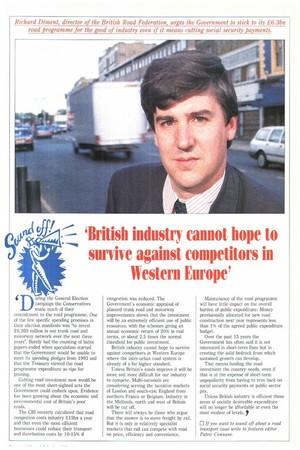'British industry cannot hope to survive against competitors in Western Europe'
Page 47

If you've noticed an error in this article please click here to report it so we can fix it.
i uring the General Election campaign the Conservatives made much of their commitment to the road programme. One of the few specific spending promises in their election manifesto was "to invest £6,300 million in our trunk road and motorway network over the next three years". Barely had the counting of ballot papers ended when speculation started that the Government would be unable to meet its spending pledges from 1993 and that the Treasury viewed the road programme expenditure as ripe for pruning.
Cutting road investment now would be one of the most short-sighted acts the Government could embark upon. Evidence has been growing about the economic and environmental cost of Britain's poor roads.
The CBI recently calculated that road congestion costs industry Z15bn a year and that even the most efficient businesses could reduce their transport and distribution costs by 10-15% if congestion was reduced. The Government's economic appraisal of planned trunk road and motorway improvements shows that the investment will be an extremely efficient use of public resources, with the schemes giving an annual economic return of 20% in real terms, or about 2.5 times the normal threshold for public investment.
British industry cannot hope to survive against competitors in Western Europe where the inter-urban road system is already of a far higher standard.
Unless Britain's roads improve it will be more and more difficult for our industry to compete. Multi-nationals are considering serving the lucrative markets of London and south-east England from northern France or Belgium. Industry in the Midlands, north and west of Britain will be cut off.
There will always be those who argue that the answer is to move freight by rail. But it is only in relatively specialist markets that rail can compete with road on price, efficiency and convenience. Maintenance of the road programme will have little impact on the overall burden of public expenditure. Money provisionally allocated for new road construction next year represents less than 1% of the agreed public expenditure budget.
Over the past 13 years the Government has often said it is not interested in short-term fixes but in creating the solid bedrock from which sustained growth can develop.
That means funding the road investment the country needs, even if that is at the expense of short-term unpopularity from having to trim back on social security payments or public sector pay.
Unless British industry is efficient those areas of socially desireable expenditure will no longer be affordable at even the most modest of levels.,
El If you want to sound off about a road transport issue write to features editor Patric Cunnane.
















































































